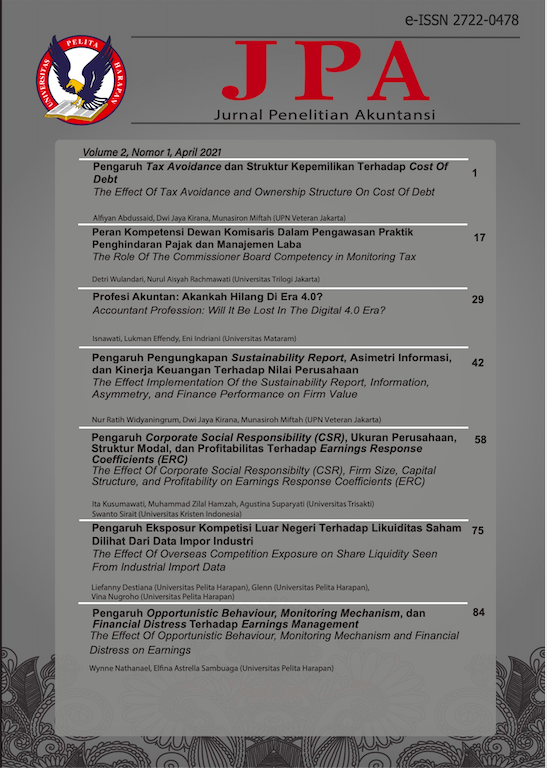PROFESI AKUNTAN : AKAHKAH HILANG DI ERA DIGITAL 4.0?
Keywords:
Industrial revolution 4.0, The Accountant profession, Big DataAbstract
The results of research from McKinsey in 2016 that the impact of digital technology the 4.0 industrial revolution in the next five (5) years there will be 52.6 million types of jobs that will disappear from the earth. And one of the professions is the accounting profession. And the fact is some of the accounting profession's work has begun to be taken away, replaced by technology. This shows automatic journaling, sorftware in the field of accounting has been sold in the community, so that simple accounting jobs do not need an accountant with a college degree. This situation raises the question whether the entire accounting profession is responsible? This study used a literature approach. Several viewpoints and research results state that the accounting profession will be replaced by robots, especially accountants and auditors. However, this profession is still relevant to the presence of the 4.0 industrial revolution era if accountants can make adjustments to technology, especially the Accounting Information System, must be able to answer the challenges in the era of the industrial revolution 4.0. especially accountants must be able to prepare themselves are able to own and improve their competence, so the profession is not taken over by other professions.
References
Badan Pusat Statistik Tahun 2017
Balasingham, K. (2016). Industry 4.0: Securing the Future for German Manufacturing Companies. Master's Thesis. University of Twente.
Baswori dan Suwandi. 2008. Memahami Penelitian Kualitatif. Jakarta. Rineka Cipta.
Bogdan, Robert dan Steven taylor. 1992. Pengantar Metode Kualitatif. Surabaya. Usaha Nasional.
Davies, R. (2015). Industry 4.0 Digitalisation for productivity and growth. http://www.europarl.europa.eu/RegData/etudes/BRIE/2015/568337/EPRS_BRI(2015)568337_EN.pdf, Diunduh pada 11 Maret 2017.
Drath, R., & Horch, A. (2014). Industrie 4.0: Hit or hype?[industry forum]. IEEE industrial electronics magazine, 8(2), pp. 56-58.
Heng, S. (2014). Industry 4.0: Upgrading of Germany's Industrial Capabilities on the Horizon. https://ssrn.com/abstract=2656608, Diakses pada 17 Juni 2017.
Ikatan Akuntan Indonesia. 2002. Standar Akuntansi Keuangan. per April 2002. Jakarta: Salemba Empat.
Kagermann, H., Lukas, W.D., & Wahlster, W. (2013). Final report: Recommendations for implementing the strategic initiative INDUSTRIE 4.0. Industrie 4.0 Working Group.
Kamus Besar Bahasa Indonesia (KBBI)
Kothari, C.R. (2004). Research Methodology Methods & Techniques. New Delhi: New Age International (P) Ltd.
Prasetyo, Hoedi ; Sutopo, Wahyudi. 2018. Industri 4.0: Telaah Klasifikasi Aspek dan Arah Perkembangan Riste. Jurnal Teknik Industri, Vol.13, No.1. Universitas Diponegoro Semarang.
Qin, J., Liu, Y., & Grosvenor, R. (2016). A Categorical Framework of Manufacturing for Industry 4.0 and Beyond. Procedia CIRP, Vol. 52, pp. 173-178.
Sasongko, Nanang. 2002. Profesi Akuntan: Masa Kini dan Tantangan Masa Depan. Jurnal Ilmiah Akuntansi. Mei Vol.1 No.2. Fakultas Ekonomi. Universitas Jenderal Ahmad Yani.
Suardhika, I Made Sadha. 2012. Kuasa Universitas dan Profesi Akuntansi. Buletin Studi Ekonomi,. Vol. 17 No.2. Universitas Udayana Denpasar.
Suwardana, Hendra. 2017. Revolusi Industri 4.0 Berbasis revolusi Mental. Jati Unik. Vol.1, No.2. Universitas PGRI Ronggolawe Tuban.
Tjandrawinata, R.R. (2016). Industri 4.0: Revolusi industri abad ini dan pengaruhnya pada bidang kesehatan dan bioteknologi. Jurnal Medicinus, Vol 29, Nomor 1, Edisi April.
Undang-Undang Nomor 34 Tahun 1954 Tentang Pemakaian Gelar.
Yahya, Muhammad. 2018. Era Industri 4.0: Tantangan dan peluang Perkembangan Pendidikan Kejuruan Indonesia. Pidato Sidang Terbuka Luar Biasa Senat Universitas Negeri Makasar tanggal 14 Maret 2018.
Zhou, K., Taigang L., & Lifeng, Z. (2015). Industry 4.0.
Downloads
Additional Files
Published
Issue
Section
License
Authors who publish with this journal agree to the following terms:
1) Authors retain copyright and grant the journal right of first publication with the work simultaneously licensed under a Creative Commons Attribution License (CC-BY-SA 4.0) that allows others to share the work with an acknowledgement of the work's authorship and initial publication in this journal.
2) Authors are able to enter into separate, additional contractual arrangements for the non-exclusive distribution of the journal's published version of the work (e.g., post it to an institutional repository or publish it in a book), with an acknowledgement of its initial publication in this journal.
3) Authors are permitted and encouraged to post their work online (e.g., in institutional repositories or on their website). The final published PDF should be used and bibliographic details that credit the publication in this journal should be included.


